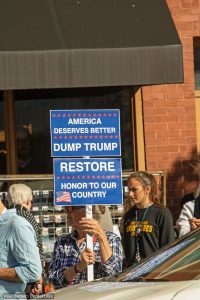
Sign of unity outside 2019 Democratic debate
Are you reading or hearing about the “fireworks” or “clashes” at last night’s Democratic presidential debate aired on CNN? If so, that’s part of the problem. This year, the televised Democratic debates have shown more about the failure of the TV debate format than about the success or substance of the candidates.
First, CNN (along with the New York Times, which co-sponsored the debate) brought together the 12 qualifying candidates on one stage, on one night, instead of splitting the event into two debates with six candidates each. Right off the bat, this caused the candidates to be given inadequate time to answer most questions, and to be cut off just when getting to the substance of most of their answers.
Second, many of the questions, especially from CNN moderator Anderson Cooper, seemed to parrot talking points from the Republican Party, or even from right-wing websites. These included questions about raising taxes, taking away assault rifles, and more. This has been a characteristic of the Democratic presidential debates for many years. Recall ABC‘s April 2008 Democratic debate, for example, where the moderators focused on critical issues of substance such as why Barack Obama wasn’t wearing an American flag pin.
Third, as always, the network moderators tried to gin up disagreements between the candidates in order to goose TV ratings, rather than simply letting the candidates naturally disagree with each or, or not. This could not be more evident than in one of the last questions of the debate, which began:
As some of you have indicated, the differences between all of you on this stage are tiny compared to the differences between you and President Trump. There are, however, fundamental differences between many of you on this stage….
As a result of these shortcomings, viewers got more heat than light. As stated above, limiting the number of candidates sharing the stage to something way less than 12 would have helped. Even better would be to have fewer TV debates, and more TV town halls. Those are in-depth discussions with only one candidate at a time. There have been several of them this year, including one with Elizabeth Warren back in March that we covered. Some of these town halls have focused deeply on a single issue, such as climate change, gun violence, and LGBTQ issues. Typically, each candidate gets at least 45 minutes on stage, which eliminates the problem of having their answers cut off. Moreover, many audience members get to ask questions, which all but does away with the right-wing talking points. And since the candidates appear one at a time rather than together onstage, there is much less opportunity for the moderators to create phony conflicts between them.
More town halls and less TV debates, please!
Photo by Becker1999 (Paul and Cathy), used under Creative Commons license. https://is.gd/hpfYMs


